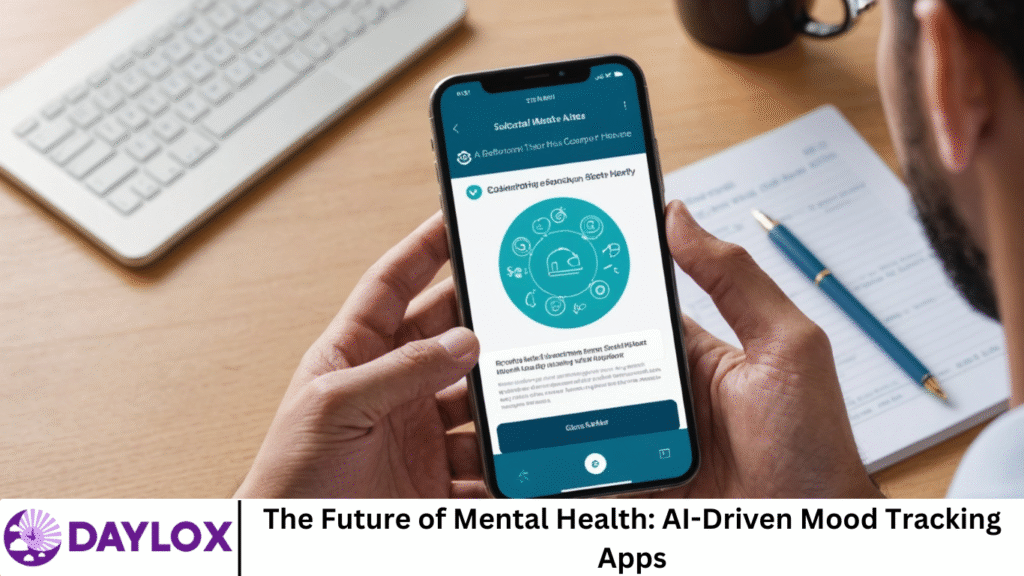Fast-paced digital world, mental health is finally receiving the attention it deserves. As stress, anxiety, and depression become increasingly common, technology is stepping up to provide innovative solutions.
Among the most promising developments is the emergence of AI-driven mood tracking apps — tools that combine artificial intelligence, mental wellness, and behavioral science to help users monitor, understand, and improve their mental well-being.
More Read: The Intelligent Calendar: Smarter Data Sources and Dynamic Views
What Are AI-Driven Mood Tracking Apps?
AI-driven mood tracking apps are mobile or web-based applications that use machine learning algorithms, natural language processing (NLP), and data analytics to monitor users’ emotions over time. These apps analyze data inputs such as:
- Mood logs
- Journals or notes
- Voice or facial expressions
- Sleep patterns
- Physical activity
- Social media behavior
The result is a more personalized, responsive, and proactive approach to mental health management than ever before.
Why Mood Tracking Matters
Tracking mood consistently can reveal emotional patterns, triggers, and cycles that would otherwise go unnoticed. For individuals dealing with mental health conditions such as anxiety, depression, bipolar disorder, or PTSD, having access to this kind of real-time insight is invaluable. It allows users and therapists to:
- Identify triggers and warning signs early
- Adjust treatment plans more effectively
- Increase self-awareness and emotional intelligence
- Empower users to take control of their mental health journey
Traditionally, mood tracking required journals or therapist-led discussions. AI now automates much of this, making it more accessible, engaging, and accurate.
The Role of AI in Mental Health Apps
1. Personalized Mental Health Insights
AI algorithms learn from user data over time, offering highly tailored feedback. For instance, if someone’s mood dips consistently after poor sleep or high social media usage, the app can identify and alert them to these trends.
Example: An app might say, “You tend to feel more anxious on Sundays. Consider incorporating a relaxing activity into your weekend routine.”
2. Emotion Detection Through NLP and Voice Analysis
Natural Language Processing enables mood tracking apps to analyze user entries — whether typed or spoken — for sentiment. AI can detect tone, word choice, and pacing to infer emotional states, sometimes more accurately than self-reports.
Example: Journaling “I’m tired of everything” might trigger an alert if the tone indicates burnout or depression.
3. Real-Time Mood Predictions and Alerts
Machine learning models can predict when a user might experience a downturn in mood based on historical data and current inputs. Apps may send notifications recommending actions like meditation, exercise, or reaching out to a therapist.
4. Integration with Wearables and Other Data Sources
AI-powered apps often sync with fitness trackers, smartwatches, and health platforms to capture biometric data such as heart rate variability, sleep quality, and physical activity — all crucial for mental health.
This holistic view helps paint a more accurate emotional picture, supporting early intervention and long-term health strategies.
Key Features of Leading AI Mood Tracking Apps
As the market for mental health apps grows, the best solutions combine the following features:
- Daily mood tracking with emoji scales, sliders, or journaling
- Voice-based or chatbot check-ins
- Emotion detection through facial recognition
- Data visualizations and mood graphs
- Behavioral nudges and goal setting
- Integration with therapy platforms
- Privacy-first data handling and encryption
Popular AI-Driven Mood Tracking Apps
Several applications are leading the charge in blending mental wellness technology with cutting-edge AI.
1. Wysa
An AI-powered chatbot that acts like a cognitive behavioral therapy (CBT) coach. Users can journal their feelings, engage in CBT exercises, and receive feedback in real-time.
2. Youper
Uses AI for emotional health coaching, powered by psychology and NLP. It helps users understand emotional patterns and improve their mood through self-guided therapy.
3. Replika
While not solely a mental health app, Replika uses AI to provide companionship and conversational support, helping users express emotions in a safe space.
4. Moodpath (now MindDoc)
Combines mood tracking with regular mental health assessments and therapist-approved content, making it ideal for long-term emotional tracking.
Benefits of AI-Driven Mood Tracking for Different Audiences
For Individuals
- Accessible mental health support anytime
- Increased self-awareness and empowerment
- Early detection of emotional health issues
- Tailored interventions and suggestions
For Therapists and Clinicians
- Data-informed treatment plans
- Improved client engagement and adherence
- Remote patient monitoring
- Streamlined reporting and session preparation
For Employers and Organizations
- Workforce wellness tracking (with consent and anonymity)
- Early stress detection to reduce burnout
- Improved employee assistance program (EAP) outcomes
The Future of AI Mood Tracking: What’s Next?
1. Predictive Mental Health Care
As AI gets smarter, apps will not only identify current states but predict future emotional trends. This could revolutionize preventative care by intervening before symptoms become serious.
2. Therapist Collaboration and Hybrid Models
We’ll see deeper integration between AI tools and human therapists. Apps may act as digital companions between sessions, providing continuity of care.
3. Cross-Platform Emotional AI Ecosystems
Future mood trackers may integrate with smart homes, cars, and other devices. Imagine your home adjusting lighting and temperature based on your mood detected via wearable data and voice tone.
4. Personalized Therapeutic Content
AI will deliver curated content — like mindfulness exercises, music, or even VR environments — based on emotional needs in real time.
5. Improved Accessibility and Cultural Sensitivity
AI will become more attuned to diverse populations, offering culturally relevant mental health insights, languages, and behavioral patterns.
Ethical Considerations and Privacy Challenges
As with any tech that collects personal health data, privacy and ethics are major concerns.
Key Challenges:
- Data Security: Protecting sensitive mood and health data from breaches.
- Bias in AI: Ensuring algorithms don’t reflect cultural or gender bias.
- Over-Reliance on Technology: Encouraging a balance between AI and human support.
- Transparency: Making algorithms understandable and explainable to users.
What Responsible Developers Must Do:
- Implement end-to-end encryption
- Adhere to HIPAA or GDPR guidelines
- Offer clear user consent options
- Use auditable and unbiased algorithms
- Provide access to human therapists or counselors when needed
How to Choose the Right Mood Tracking App
When choosing a mood tracker with AI capabilities, consider the following:
- Credibility: Is the app developed with input from psychologists or mental health professionals?
- Privacy Policy: Does the app protect your data?
- User Interface: Is it intuitive and easy to use?
- Customization: Can it be tailored to your needs or mental health conditions?
- Support Options: Does it provide emergency resources or therapist integration?
Frequently Asked Question
What are AI-driven mood tracking apps?
AI-driven mood tracking apps use artificial intelligence and machine learning to monitor, analyze, and interpret users’ emotional states. They collect data from text inputs, voice, facial expressions, wearable devices, and behavior patterns to offer personalized mental health insights and recommendations.
How do these apps support mental health?
These apps help users recognize emotional patterns, detect early signs of anxiety or depression, and suggest actionable strategies like mindfulness exercises or lifestyle adjustments. Some also integrate with therapists, enabling more informed care between sessions.
Are AI mood tracking apps accurate?
While no tool is 100% accurate, advanced apps using NLP, biometric data, and behavior analysis can provide reliable insights into mood patterns over time. Their accuracy improves as they learn from consistent user input and behavior.
Can AI mood tracking apps replace therapy?
No. These apps are designed to complement, not replace, professional therapy. They offer self-help tools and continuous support, but human therapists provide empathy, complex diagnosis, and tailored treatment that AI cannot replicate.
What data do mood tracking apps collect?
Depending on the app, they may collect:
- Text or voice journal entries
- Mood ratings
- Sleep and activity data
- Wearable device metrics
- Social media or screen time usage
All of this data is analyzed to generate mood insights.
Are these apps safe and private?
Reputable apps follow strict privacy policies, use encryption, and comply with regulations like HIPAA or GDPR. Always check the app’s privacy terms and user reviews before sharing sensitive information.
What does the future hold for AI in mental health apps?
The future includes:
- Predictive mental health alerts
- Deeper therapist integration
- Voice and emotion recognition improvements
- Culturally adaptive AI models
- Real-time, personalized therapeutic content
These advances aim to make mental health support more proactive, accessible, and personalized than ever before.
Conclusion
AI-driven mood tracking apps are changing the landscape of mental health care. With their ability to provide personalized insights, real-time support, and predictive intervention, they empower users to take proactive steps toward emotional wellness. As AI continues to evolve, these tools will become more intuitive, accurate, and human-centric — not replacing therapists, but enhancing the way we understand and care for our mental health. The future of mental wellness is not just digital — it’s intelligent, empathetic, and accessible to all.


